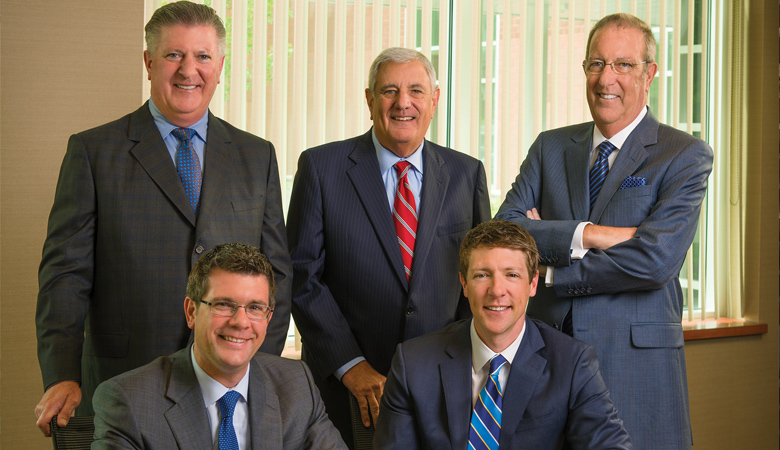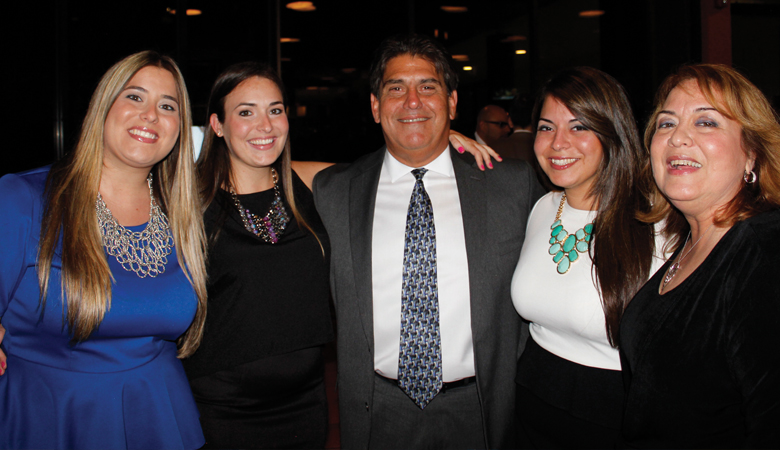16 of 29 Olsen family members employed by Les Olson Company are pictured above. Top row, from left to right: James Olson, CEO; Jesse Olson, Payroll and Benefits Administrator; Matt Olson, CTO; Riley Olson, Sales Administrative Assistant; Sean Clawson, Warehouse; Paul Clawson, Sales and Leasing Administration; Scot Olson, Director of Marketing; Troy Olson, President. Bottom row, from left to right: Debbie Sue Arbon, Adminatrative Assistant and Marketing Content Editor; Tim Olson,Salt Lake Service Manager; Sam Thailer, Software Solutions Engineer; Lisa Thaller, CFO and Chairman of the Board; Deb Olson, Executive Leasing Manager and Secretary Treasurer; Chris Weenig, Chief Sales and Marketing Officer; Ivy James, Credit and Collections Manager; Caitlyn Withers, Service Administration
Family-run Dealerships Share Ways that Help Them Succeed.
Across the globe, family businesses remain among the most important economic drivers. According to Global Data Points, they account for more than two-thirds of companies worldwide, and 50% to 80% of employment in most countries.
Given the kind of reach family businesses have, it is not surprising that our industry is peppered with numerous family-run businesses. However, what is particularly notable is that these companies are well into their second, third, or fourth generation of family leadership. A recent survey by the Family Business Institute noted that only 30% of family businesses even make it to the second generation, and only 12% are viable into their third. Only a modest 3% make it to their fourth generation and beyond.
These statistics hint at the challenges family businesses face as they transition from one generation’s leadership to the next. While dealerships across the board face similar challenges in their paths to success, family businesses have an additional layer, as they mix fathers and mothers with sons, daughters, nephews, nieces, grandchildren and beyond. And as these businesses cross over into the second, third, and fourth generations, family life becomes inseparable from business life.
Each family-run dealership employs their own methods to ensure family members not only succeed for themselves, but also for the continued success of the business. Many of their tactics are backed by reputable analysts of family enterprises, who encourage these businesses to hold family members as accountable as other non-family employees and to look outside family members to fill any leadership gaps.
Simultaneously, these dealerships treat employees and customers like family.
Prior Experience Required

Clockwise from top left: Gordon Flesch Company’s Bill Flesch, EVP; Tom Flesch, president and CEO; John Flesch, EVP and Treasurer; Mark Flesch, VP, Sales ““ Eastern Region; Patrick Flesh, VP, Sales ““ Western Region
Tom Flesch, the current president and CEO of Gordon Flesch Company, had a front row-seat to his father’s growing business, which opened in 1956 in Madison, Wisconsin. While growing up, Flesch worked at his father’s company while on breaks from attending school and during the summer as a janitor or a delivery person.
However, after graduating from college, Tom did not assume a position immediately with his father’s already very successful business.
“In order to come into the business, it wasn’t something he [Gordon Flesch] wanted us to do right out of school,” said Tom. “He wanted us to take another job, become trained by somebody else, and take those few years [after graduating] to get guidance from people outside the family business.”
Tom firmly believes that all employees need time to acclimate to the working world, comparing the experience to breaking a horse.
Wayne Rivers, president and co-founder of the Family Business Institute, agrees.
“They need time to mature, individuate, and gain confidence learning and doing things as distinct human beings, rather than just children of successful parents,” said Wayne Rivers in a Wall Street Journal blog. “They need to learn how to work, to be punctual, to earn their own money, and to be held accountable. Everyone wins when potential successors have excellent training and gain skills and confidence outside the nuclear family.”
Joining Gordon Flesch was not a given for Tom. Even though he understood his father had his own company, Tom kept an open mind about signing on to the family business. He emphasized that he was looking for the right opportunity that fit his skills.
For two years, Tom sold business insurance for Liberty Mutual in Milwaukee, making his fair share of cold calls, before an audio/visual equipment sales representative position opened up at Gordon Flesch Company. The job Tom interviewed for had been recently vacated by a gentleman who, along with his wife, had been his babysitter.
Tom, along with his two brothers John and William, who joined the company in 1976 and 1982, respectively, worked diligently and were held to the very same standards as every other non-family employee working for the company. Today, each of the three brothers holds a senior position at Gordon Flesch Company.
Additionally, both of Tom’s sons””Patrick and Mark””now work for Gordon Flesch Company. Similar to their father, each son spent approximately three years in other sales organizations before they interviewed for sales roles that had opened up organically.
Like any other applicants, Patrick and Mark interviewed for their jobs and after being well-received by their interviewers, they were offered positions in which they would be held to the same standards as every other employee in a similar role. Like every other sales rep, Patrick and Mark both had to meet their quotas and earn their commissions.
“They had to earn the respect of everyone else in the company, as we did when we came up,” said Tom.
Since joining the company roughly 10 years ago, Patrick and Mark have gradually moved up the company ranks from territory sales reps to sales managers, to their current roles as vice presidents of sales.
“It’s been a slow process, but I think it’s been well-received by other people in the company,” said Tom.
And the Gordon Flesch Company has also continued growing. With offices in Wisconsin, Illinois, Indiana and Ohio, the dealership employs over 600 people (compared to 50 when Tom started in 1977) and brings in more than $150 million in revenue.
Founding Inspiration
According to an April 2015 article from the Harvard Business Review, successful family businesses “usually have one key family member (but up to three) standing at the center of the organization, like the sun in our solar system. These people personify the corporate identity and align differing interests around clearly defined values and a common vision. They focus on the next generation, not the next quarter. They tend to embrace strategies that put customers and employees first and emphasize social responsibility. And they have strong personalities that draw talented people into their orbits and keep them there.”
These statements easily sum up one of the most successful family-run dealerships in our industry: Les Olson Company.
Founded in 1956 by the charismatic Les Olson and his wife Reva, the company’s leaders have consistently looked beyond any particular year’s bottom line to focus on hard-working values and compassion. Today, the third generation of Olson family members is at the helm of this customer-driven dealership with seven offices in Utah and Clark County Nevada, and the family’s fourth generation is being developed to insure Les Olson’s business legacy continues.
“It all goes back to our founders, Les and Reva, our grandparents, who really set an incredible foundation, teaching us how to work together and play together,” said Troy Olson, president of Les Olson Company. “As the business grew more successful, Les and Reva put a swimming pool in their backyard. As cousins, we got to know each other very well, playing together and working together in Grandma and Grandpa’s yard. They had cherry trees and we would go out there and pick cherries for what seemed like forever.”
Some of Troy’s earliest memories””and those of his cousin and current Les Olson CEO James Olson””consist of pulling weeds in front of the company’s first location or sweeping the warehouse floor. Being part of the business was simply a way of life for the Olson family. In speaking with Troy and James, it seems that most family members were born with a passion to help others through their business and a dedication to carry on Les and Reva’s legacy.
“The goal is to build a business to last, not to sell,” said Troy. “Our grandparents’ dream and mission was to build this business to last, and that’s ours as well to get this well beyond this generation.”
Even though both Les and Reva have long since passed on, the family members and employees of their company carry on their values throughout the dealership’s hallways today. For example, their pictures grace the walls. The company’s website includes several references to its founders, including a video detailing the love and lives of Les and Reva, all shared by family members. In addition, all of the company’s employees have internalized and adopted Les and Reva’s sayings and expressions. Furthermore, even the company’s decade’s old advertising jingle can be sung or hummed on queue.
“Les had a plaque on his desk that said, “˜People are important. Treat them that way,'” recalled Troy. “Les lived that to a tee.”
When it came to the business, Les was Les at work and Grandpa on the weekends, and it was Jim at work and Dad at home, according to James Olson. In an effort to minimize conflict and perceptions of favoritism, the company has an established policy that parents do not manage their own children. However, family members may have an aunt, uncle, or a non-family member as their immediate manager.
“We recognize that we can have a spirited conversation, we have opinions, and we are going to share,” said Troy. “But we know how to communicate, and we know how to be respectful. “We learned from watching them [the older family members]. They’ve taught us that you have to talk about issues by getting in a room and working things out. And you have to be bold enough to make the right decisions to protect the company.”
Wisely, Les surrounded himself not only with his family members, but also several trusted advisors who helped structure the business and keep it on track.
“A key benefit of having independent board members is their different and diverse perspectives, as well as their ability to augment the business owner’s own knowledge and expertise with their individual, different backgrounds and experience,” according to a white paper on family business governance written by the Deloitte Global Center for Family Governance.
Today, the company continues to value the rich advice of professionals from outside the company. Les Olson currently has four vice presidents from outside the company, two of which are members of the company’s nine-person board of directors.
In keeping with Les’s mantra of treating others as he would want to be treated, Les Olson offers all employees a suite of comprehensive benefits, including 401(k) matching, profit sharing, health, and dental plans. The company also facilitates many opportunities to serve its communities from volunteering at food banks to raising money for those suffering from cancer.
“Our co-workers are our customers,” stated Troy, as if he were channeling one of Les’s philosophies himself.
“We don’t take the human out of the job,” said James.
Of Les Olson Company’s 230 current employees, 28 are family members. And with 11 of those members coming from the fourth generation of Olsons already working in-house, we can expect to see Les Olson Company continue to operate as a family-owned business for many years to come.
Separate Roles Ensure Success
When the Lopez sisters””Monica, Michele, and Mallory””were children, they would ride in the backseat from Miami through the Florida Keys, listening to their mother Madelyn and father Jose, co-founder of Barlop Business Systems, talk about the family business. While they used to complain about their parents’ constant banter about the company and business in general, now that they’re involved in the business, they too spend all their time talking shop.
“It was very inspiring to watch him grow something from nothing,” said Mallory Lopez of her father. “Seeing him be so driven is what has made us so driven.”
Like their parents, all three Lopez sisters have worked in nearly every role at Barlop from receptionist to inside sales. And each had to work diligently to prove themselves to their father, as well as to non-family employees.
According to Family Business Institute President and Co-Founder Rivers, “Family members, more than any other employees, need to be held accountable for their actions. They need to have crystal-clear roles and responsibilities and regular reviews to make sure they’re living up to the requirements of their job descriptions.”
Driven by their distinct, individual personalities, Monica, Michele, and Mallory each took different paths within the company, which has helped them avoid conflict within the family. Michele serves as Barlop’s supplies and parts manager, while Monica is the vice president of sales and Mallory is the company’s controller.
“We see the value in each other’s strengths,” said Mallory. “That helps us keep the balance within the company.”
With the tone set by their father, who serves as Barlop’s president, and mother, who previously worked as the company’s supplies and parts manager, every employee is held to the same standard.
“A lot of the morale comes from treating employees as family,” said Mallory, who emphasized that Barlop’s executive team prefers to promote from within its ranks, helping to equal the playing field across all employees.
Serving small- to mid-sized businesses in the Miami area, Barlop offers its 35 employees comprehensive health and retirement benefits, as well as community-building opportunities such as company picnics and charity events such as a walk sponsoring Autism Speaks. These benefits and opportunities help create a family-oriented environment.
While conflicts certainly arise from time to time, the Lopez sisters wouldn’t want to work anyplace else. At the end of the day, they are each other’s greatest source of strength and mutual inspiration.
“You always have somebody to talk to,” said Mallory. “Working with my parents and my sisters helps relieve some of the stress [of running a business] because they understand exactly where I’m coming from.”
* * * * *
Building a Family Business to Last
1. Avoid complacency and hubris. Be willing to make changes to improve and be better. Always be changing, learning, improving, and seeking out what you can do better ““ whether it’s customer satisfaction, employee morale, gross profit. Pick something.
2. Find ways to challenge the status quo. Join a peer group, seek out a family business advisory member from outside the family, bring in new talent. Find ways to let other smart people challenge you in tasteful ways.
3. Improve decision-making. In the first generation, decisions are easier to make because they are made solely with the business in mind. As businesses progress into the hands of the second, third, fourth generations, decisions can get muddled in considering all the family members, and decision-making can be delayed or even avoided to prevent conflict. Keep the business first, and don’t get bogged down by making hard choices.
4. Do strategic planning every year to account for the constant changes and challenges to the business. All employees from the bottom up should be considered when planning. Family businesses need input and engagement from them to determine what needs to change, what companies can do to be better, where they are deficient, where employees see the competition outpacing them. Employees have valuable insight. Listen to what they are saying.
5. Focus on risk management. Identify threats to the business and barriers that will hold the company back. Consider how disruptions ““ such as acquisitions or new technology ““ will play a role.
Source: Wayne Rivers, president and co-founder, The Family Business Institute
* * * * *
Family Business Trends
• 87% have clearly identified who is ultimately responsible for the company’s succession
• 70% are considering a woman for their next CEO
• 90% have a board of directors
• 90% have regular family or shareholder board meetings to discuss business issues
• 76% refer to themselves as a family business in their branding
• 81% engage in charitable or philanthropic activities
• 83% expect spending on cybersecurity to increase
Source: Ernst & Young



